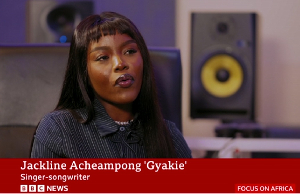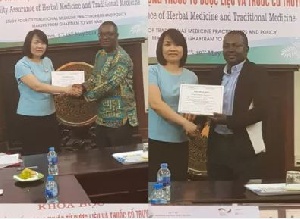The German Development Corporation has supported some members of the Ghana Federation of Herbal Medicine Practitioners Associations (GHAFTRAM) to understudy Vietnam’s World Health Organisation (WHO) complaint.
A statement signed by Mr William Kojo Odum Eduful, the President of GHAFTRAM and copied to the Ghana News Agency noted that Mr Bernard Kofi Turkson, a Medical herbalist with the Ghana health Service, Ms Annabella Adade, a Medical Herbalist, Mr Joseph Kofi Takyi, the Regional Chairman of GHAFTRAM, Ashanti region were among those supported.
The others were Dr Mohammed Kweku Edu, Chief Executive Officer of Edu Herbal and an Advisor to GHAFTRAM Central Region and Dr Isaac Kingsley Amponsah, a Senior lecturer at the Department of Herbal Medicine in the Kwame Nkrumah University of Technology were supported to gain knowledge in herbal medicine.
The participants were being hosted by the Ha Noi University of Pharmacy (HUP) for the 2 weeks from May 6 to May 20.
This training is to enlighten the participants on high quality and affordable medicines in Africa and South East Asia and also to undergo a two week intensive training in Vietnam Good Agriculture and Collection Practices (GACP) and Good Manufacturing Practices (GMP) for herbal medicine production.
They were also to learn the success story of Vietnam’s integration of allopathic care and traditional herbal medicine.
The statement said the use of herbal medicine remained a significant aspect of health care delivery system in Ghana as in most African countries.
It added that “Ghana has seen considerable growth of the herbal industry and enjoying an enviable position in the sub region and Africa as the only country to integrate herbal medicine to allopathic medicine”.
As part of the training, participants embarked on a number of knowledge acquisitions, which exposed them to the dynamics and innovations introduced by Vietnam to improve and sustain its herbal medicine industry.
The statement noted that the participants discovered communities were involved in the cultivation of medicinal plants to support its usage in health delivery instead of the traditional cultivation of rice.
Participants were introduced to machines used for dispensing decoctions in sachets to facilitate patient compliance, a technology the leadership of GHAFTRAM look forward to transferring to Ghana with support from government and other funding agencies.
The statement said the participants had gain more insight through the two weeks intensive training into avenues for sustainable development of the herbal industry and opportunities in the herbal sector.
The statement said government could explore the numerous potentials in the herbal industry to create more jobs in the country through the Vietnam example.
Health News of Saturday, 19 May 2018
Source: ghananewsagency.org
Ghanaian Herbal Medicine practitioners understudy Vietnam’s integration method
Entertainment












